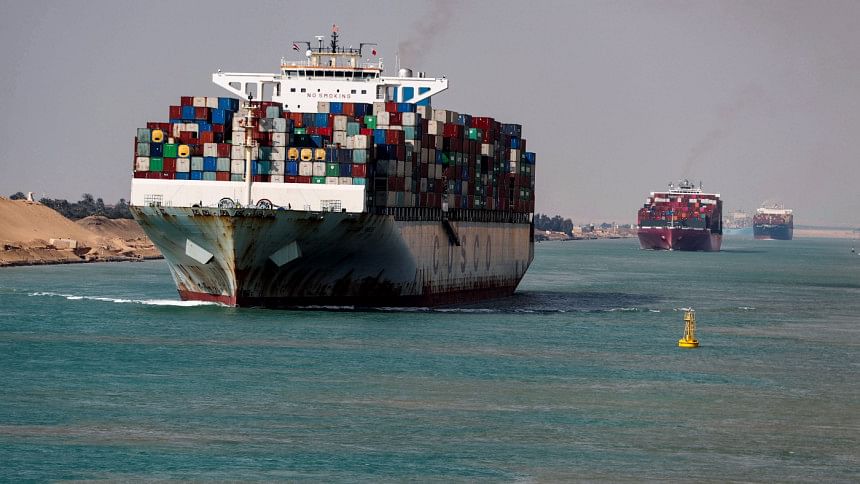Red Sea container shipping down 30% over attacks: IMF

Container shipping through the Red Sea has dropped by nearly one-third this year as attacks by Yemen's Huthi rebels continue, the International Monetary Fund said Wednesday.
"Container shipping... has declined by almost 30 percent," said Jihad Azour, director of the IMF's Middle East and Central Asia department, adding that "the drop in trade accelerated in the beginning of this year".
The Iran-backed Huthis have launched more than 30 attacks on commercial shipping and naval vessels since November 19, the Pentagon said on Tuesday.
The rebels say the attacks are in solidarity with the Palestinians and in protest of the Israel-Hamas war that has been raging in the Gaza Strip since October.
The IMF's PortWatch platform indicates that the total transit volume through the Suez Canal was down 37 percent this year through January 16 compared with the same period a year earlier.
The canal connects the Red Sea to the Mediterranean Sea.
Huthi attacks have prompted some shipping companies to detour around southern Africa to avoid the Red Sea, a vital route that normally carries about 12 percent of global trade, according to the International Chamber of Shipping.
"The level of uncertainty is extremely high and the developments will determine the extent of change and shift in trade patterns in terms of volume but also in terms of sustainability," Azour told reporters in an online briefing.
"Are we on the verge of major change in trade routes or is it temporary because of the increase in costs and the deterioration of the security costs?"
The United States heads a coalition to protect Red Sea shipping, and is seeking to apply diplomatic and financial pressure by redesignating the Huthis as a "terrorist" group.
The Red Sea is particularly vital for European trade.
Last week the European Union's trade commissioner said maritime traffic through the Red Sea shipping route had fallen by 22 percent in a month because of the rebel attacks.
The European Union is pushing to launch its own naval mission in the Red Sea to help protect international shipping.
EU countries have given initial backing to the plan and are aiming to finalise it by a meeting of the bloc's foreign ministers on February 19.
The United States and Britain have launched repeated strikes against Huthi capabilities in Yemen, but the Iran-backed movement is still able to hit vessels.
Wednesday's IMF briefing came as the Washington-based fund released a revised economic outlook for countries in the Middle East and North Africa due to the Israel-Hamas war.
The IMF now sees the economies of the region expanding 2.9 percent this year, a decrease of half a percentage point from its October forecast.
The economic downturn in the occupied West Bank and the war-ravaged Gaza Strip and was "immense", said Azour.
In 2023, real GDP growth in Gaza and the West Bank was estimated to have dropped to about minus six percent, the IMF said, adding it reflected a nine percentage points downgrade from its October outlook.
"We project that the economy will keep on contracting in 2024 if there is no fast and quick cessation of hostilities and reconstruction," Azour said.
For emerging market and middle-income economies in the region, total funding requirements over 2024 were projected to $186 billion, the IMF said, up from $156 billion in 2023.

 For all latest news, follow The Daily Star's Google News channel.
For all latest news, follow The Daily Star's Google News channel. 








Comments